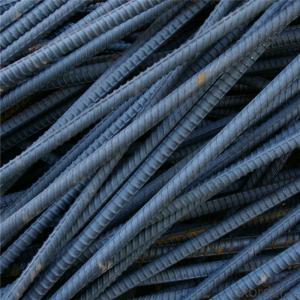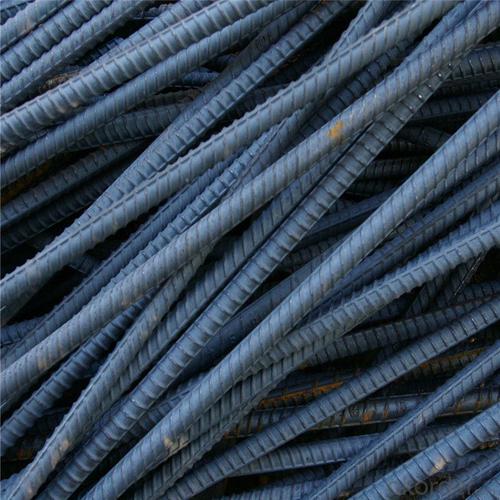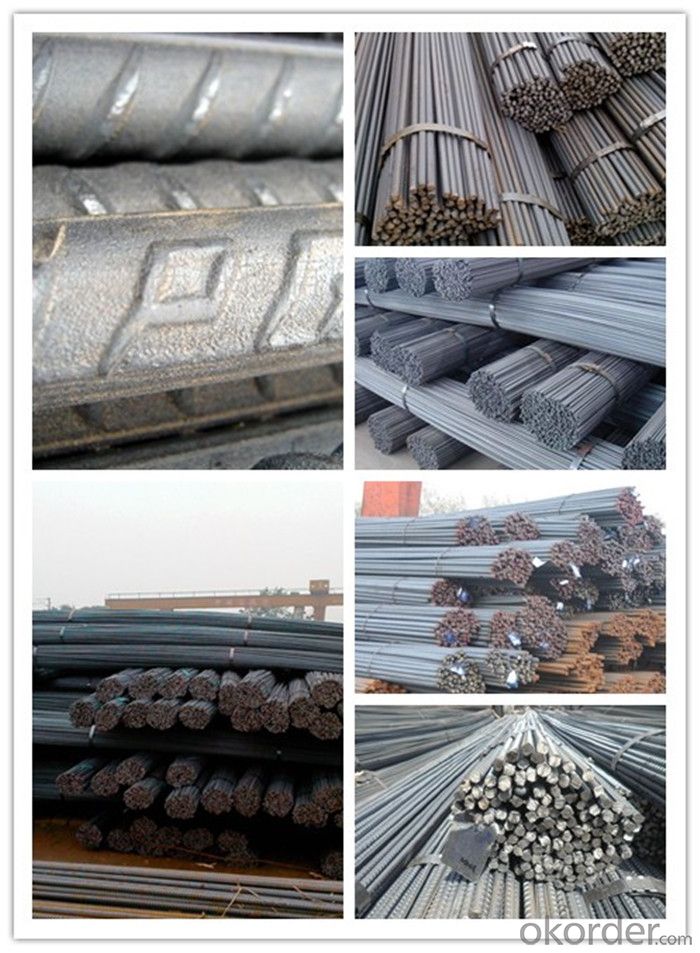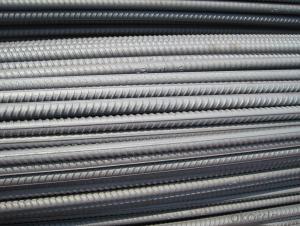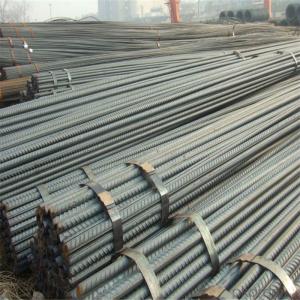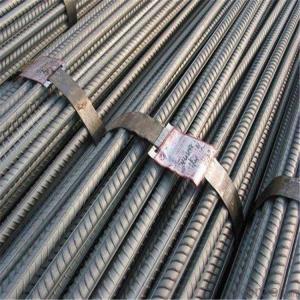Bs4449 Deformed Steel Bar with All Sizes
- Loading Port:
- Tianjin
- Payment Terms:
- TT OR LC
- Min Order Qty:
- 25 m.t.
- Supply Capability:
- 50000 m.t./month
OKorder Service Pledge
OKorder Financial Service
You Might Also Like
Specification
Bs4449 Deformed Steel Bar with All Sizes
Description of Bs4449 Deformed Steel Bar:
1, Diameter: 5.5mm-10mm rounds reinforcing steel bar
10m- 40 rods reinforcing Bs4449 Deformed Steel Bar
2, Length: 6m, 9m, 12m or customized
3, Standard: GB, ASTM, AISI, SAE, DIN, JIS, EN
OEM technology - send detailed technical parameters for accurate quotation.
2, Produce Process: smelt iron - EAF smelt billet - ESR smelt billet -
hot rolled or forged to get the steel round bar and plate
3, Heat Treatment: annealing, normalizing, tempering, quenching
4, Surface Treatment: Black
5, Quality Assurance: We accept third party inspection for all orders.
You can ask testing organizations such as SGS, BV, etc. to test our products before shipping.
Chemical Composition of Bs4449 Deformed Steel Bar:
Grade | Technical data of the original chemical composition(%) | |||||
Reinforcing steel bar HRB335 | C | Mn | Si | S | P | B |
≤0.25 | ≤1.60 | ≤0.80 | ≤0.045 | ≤0.045 | >0.0008 | |
Physics Capability | ||||||
Yield Strength(N/cm2) | Tensile Strength(N/cm2) | Elongation(%) | ||||
≥ 335 | ≥490 | ≥16 | ||||
Reinforcing steel bar HRB400 | C | Mn | Si | S | P | B |
≤0.25 | ≤0.16 | ≤0.80 | ≤0.045 | ≤0.045 | 0.04-0.12 | |
Physics Capability | ||||||
Yield Strength(N/cm2) | Tensile Strength(N/cm2) | Elongation(%) | ||||
≥ 400 | ≥ 570 | ≥ 14 | ||||
Product Show of Bs4449 Deformed Steel Bar:
Company Information:
CNBM International Corporation is the most important trading platform of CNBM group.
Whith its advantages, CNBM International are mainly concentrate on Cement, Glass, Iron and Steel, Ceramics industries and devotes herself for supplying high qulity series of refractories as well as technical consultancies and logistics solutions.

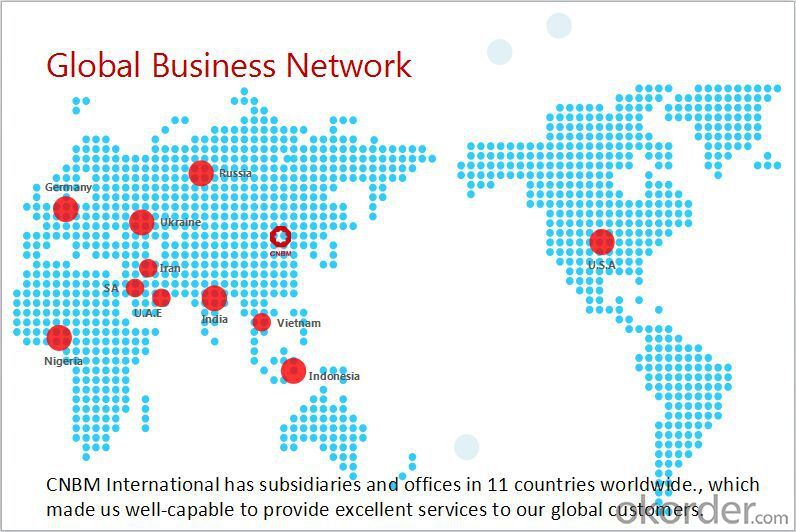
FAQ:
1, Your advantages?
professional products inquiry, products knowledge train (for agents), smooth goods delivery, excellent customer solution proposale
2, Test & Certificate?
SGS test is available, customer inspection before shipping is welcome, third party inspection is no problem
3, Factory or Trading Company?
CNBM is a trading company but we have so many protocol factories and CNBM works as a trading department of these factories. Also CNBM is the holding company of many factories.
4, Payment Terms?
30% TT as deposit and 70% before delivery.
Irrevocable L/C at sight.
5, Trading Terms?
EXW, FOB, CIF, FFR, CNF
6, After-sale Service?
CNBM provides the services and support you need for every step of our cooperation. We're the business partner you can trust.
For any problem, please kindly contact us at any your convenient time.
We'll reply you in our first priority within 24 hours.
- Q: What are the different methods of improving the creep resistance of special steel?
- To enhance the creep resistance of special steel, various methods can be employed. These methods aim to improve its ability to withstand high temperatures and constant stress over a long period of time. Commonly used techniques include: 1. Alloying: By adding specific elements like chromium, molybdenum, tungsten, and vanadium, the creep resistance of special steel can be significantly enhanced. These alloying elements form strong carbides or intermetallic compounds that impede dislocation movement, thereby increasing the material's strength and resistance to creep. 2. Heat treatment: Precise heat treatment techniques, such as quenching and tempering, annealing, and normalizing, can be employed to improve the creep resistance of special steel. These processes alter the microstructure of the steel, resulting in the formation of fine-grained and homogeneous structures that offer better creep resistance. Heat treatment also helps in relieving residual stresses and enhancing the overall strength of the material. 3. Grain refinement: Special steel can undergo processes that refine its grain structure, thereby improving its creep resistance. Techniques like controlled rolling, recrystallization, and severe plastic deformation can reduce the grain size and make it more uniform. This refined microstructure hinders dislocation movement and enhances the material's resistance to creep deformation. 4. Precipitation hardening: Special steel can be subjected to precipitation hardening methods, where it is heated and then rapidly cooled to induce the formation of fine precipitates. These precipitates act as barriers to dislocation movement, thereby improving the material's strength and creep resistance. 5. Surface modification: Surface modification techniques, such as shot peening, laser surface melting, and surface coatings, can be applied to increase the creep resistance of special steel. These methods improve the surface integrity, reduce roughness, and introduce compressive residual stresses, all of which contribute to enhanced creep resistance. It is important to consider the specific requirements of the application and the type of special steel being used when selecting and combining these methods. The goal is to optimize the material's microstructure, chemical composition, and surface characteristics in order to achieve the desired creep resistance and ensure long-term performance at elevated temperatures.
- Q: How is special steel tested for quality and durability?
- Special steel is tested for quality and durability through a series of rigorous processes and tests. These tests are designed to ensure that the steel meets the required standards and can withstand various conditions and applications. One common method used to test special steel is the tensile strength test. This test measures the maximum amount of stress that the steel can withstand before breaking or deforming. It is conducted by applying a pulling force on a sample of the steel until it reaches its breaking point. The results of this test determine the steel's ability to resist external forces and its overall strength. Another important test is the hardness test. The hardness of the steel is a critical factor in determining its durability. This test involves measuring the resistance of the steel to indentation or scratching. The steel sample is pressed against a hard surface, and the depth of the indentation is measured. The harder the steel, the more resistant it is to wear and deformation. In addition to these mechanical tests, special steel is also subjected to various chemical and metallurgical tests. These tests help determine the chemical composition and microstructure of the steel, which are crucial factors in ensuring its quality and durability. For example, spectroscopic analysis is used to determine the exact chemical composition of the steel, while metallography allows for the examination of the steel's microstructure, including the presence of any impurities or defects. Furthermore, various non-destructive testing methods are employed to assess the steel's internal structure without causing any damage to the material. These methods include ultrasonic testing, magnetic particle inspection, and radiographic testing. Ultrasonic testing uses high-frequency sound waves to detect any internal flaws or defects in the steel, while magnetic particle inspection relies on the application of magnetic fields to identify surface cracks or discontinuities. Radiographic testing, on the other hand, uses X-rays or gamma rays to examine the internal structure and detect any defects that may compromise the steel's quality and durability. Overall, the testing of special steel for quality and durability is a comprehensive process that combines mechanical, chemical, metallurgical, and non-destructive testing methods. Through these tests, manufacturers can ensure that the steel meets the required standards and can perform reliably in various applications, thereby guaranteeing its quality and durability.
- Q: What are the main applications of special steel in the pharmaceutical industry?
- Special steel is widely used in the pharmaceutical industry for various applications. One of the main applications is in the manufacturing of equipment and machinery used for drug production, such as mixing tanks, reactors, and centrifuges. Special steel is preferred in these applications due to its excellent corrosion resistance, high strength, and durability, ensuring the integrity of the pharmaceutical processes and preventing contamination. Additionally, special steel is also used for constructing cleanroom furniture and fixtures, which require high cleanliness standards to maintain the sterility of pharmaceutical environments. Overall, special steel plays a crucial role in ensuring the quality, safety, and efficiency of pharmaceutical manufacturing processes.
- Q: How does stainless steel contribute to the construction industry?
- Stainless steel contributes to the construction industry by providing durability, corrosion resistance, and aesthetic appeal. It is widely used in structural applications, such as building facades, bridges, and roofing, as it can withstand harsh weather conditions and maintain its strength over time. Stainless steel's resistance to corrosion also makes it a suitable choice for plumbing, electrical, and HVAC systems, ensuring longevity and minimizing maintenance. Additionally, its sleek and modern appearance enhances the overall aesthetics of architectural designs.
- Q: What is the importance of heat treatment in special steel?
- Heat treatment is of utmost importance in special steel because it significantly enhances its mechanical properties and overall performance. Special steel, also known as alloy steel, is specifically designed to possess specific characteristics such as high strength, hardness, wear resistance, and toughness, making it suitable for demanding applications in industries like automotive, aerospace, and tooling. The heat treatment process involves controlled heating and cooling of the steel to alter its microstructure, which in turn affects its properties. There are several heat treatment techniques employed, including annealing, tempering, quenching, and hardening, each serving a specific purpose. One key importance of heat treatment in special steel is the ability to increase its hardness. Through techniques like quenching and hardening, the steel can be transformed into a hardened state, where it becomes much stronger and more resistant to abrasion and wear. This is crucial for applications that involve heavy loads, impact, and abrasive environments. Additionally, heat treatment can also improve the toughness and ductility of special steel. By carefully controlling the cooling rate during the heat treatment process, the steel's microstructure can be adjusted to achieve a fine-grained structure, enhancing its toughness and ability to withstand sudden impacts or shocks. This is particularly important in applications where the material needs to absorb energy and resist fractures, such as in structural components or tools. Furthermore, heat treatment can also improve the machinability and dimensional stability of special steel. By subjecting the steel to annealing or tempering processes, internal stresses and residual strains can be relieved, resulting in a more stable and easier-to-machine material. This is crucial in industries where precision and dimensional accuracy are paramount. In conclusion, the importance of heat treatment in special steel cannot be overstated. It is a vital process that allows for the optimization of the steel's mechanical properties, ensuring it meets the specific requirements of demanding applications. By carefully manipulating the microstructure, heat treatment enhances the steel's hardness, toughness, and machinability, making it a versatile and reliable material in various industries.
- Q: What are the properties of structural steel?
- Structural steel possesses several key properties that make it an ideal material for construction purposes. Firstly, it has a high strength-to-weight ratio, meaning it can withstand heavy loads and forces while remaining relatively lightweight. Secondly, it is highly durable and resistant to corrosion, making it suitable for both indoor and outdoor applications. Additionally, structural steel is highly versatile and can be easily fabricated into various shapes and sizes to meet specific design requirements. Lastly, it has excellent fire resistance properties, as it does not burn or contribute to the spread of flames, ensuring the safety of structures in case of fire incidents.
- Q: How is special steel used in the telecommunications supply chain?
- Special steel is used in the telecommunications supply chain for a variety of applications. It is commonly used in the manufacturing of telecommunication towers, antennas, and satellite dishes due to its high strength and durability. Special steel is also utilized in the production of transmission lines, cables, and connectors, where its corrosion resistance and electrical conductivity properties are essential. Additionally, special steel is employed in the fabrication of equipment racks, cabinets, and enclosures, providing a sturdy and secure housing for telecommunication devices. Overall, special steel plays a crucial role in ensuring the reliability and performance of telecommunications infrastructure.
- Q: What are the different corrosion protection methods used for special steel?
- To ensure the durability and longevity of special steel, various methods are employed for corrosion protection. These methods encompass: 1. Coatings: The application of diverse coatings, including paint, epoxy, or zinc, creates a protective layer on the steel surface. Such coatings function as barriers, preventing direct contact between moisture, corrosive elements, and the steel. 2. Galvanization: By coating the steel with a layer of zinc through the process of galvanization, a sacrificial barrier is formed wherein the zinc corrodes instead of the steel. Galvanized steel is commonly utilized in outdoor applications such as fences, poles, and roofing. 3. Stainless steel: Special steel can be manufactured using stainless steel, which contains a high percentage of chromium. The presence of chromium results in the formation of a passive layer on the steel's surface, endowing it with excellent corrosion resistance. Stainless steel finds wide usage in industries like construction, food processing, and medical equipment. 4. Cathodic protection: This method involves the creation of an electrical current or the utilization of sacrificial anodes to protect the steel. By introducing a more reactive metal (sacrificial anode) or applying an electrical current, corrosion is minimized as the reactive metal corrodes instead of the steel. 5. Alloying: Modifying the steel's composition by incorporating elements like nickel, molybdenum, or copper can enhance its resistance to corrosion. These alloying elements form a protective layer on the surface, rendering the steel more resistant to rust and other forms of corrosion. 6. Passivation: Passivation is a chemical process that eliminates free iron from the steel's surface, leading to the formation of a protective oxide layer. This layer acts as a barrier against corrosion, augmenting the steel's resistance to rust and other forms of corrosion. 7. Proper maintenance: Regular inspection, cleaning, and maintenance of special steel play a vital role in preventing corrosion. The removal of dirt, debris, and other contaminants from the steel's surface aids in preserving its protective coatings and averting corrosion. It is crucial to select the appropriate corrosion protection method based on the specific application and environmental conditions to ensure the long-term performance and durability of special steel.
- Q: What are the specific requirements for special steel used in nuclear applications?
- The specific requirements for special steel used in nuclear applications include high resistance to corrosion, excellent mechanical properties, and the ability to withstand high temperatures and neutron irradiation. Additionally, the steel must possess low levels of impurities and be highly resistant to embrittlement. It must also be capable of maintaining its integrity and structural stability over long periods of time, ensuring the safety and reliability of nuclear systems.
- Q: How does special steel perform in terms of thermal conductivity?
- Special steel typically has lower thermal conductivity compared to other materials like aluminum or copper. This means that it is not as efficient in conducting heat, but it can still be used in applications where high temperatures need to be controlled or insulated, such as in industrial furnaces or high-temperature equipment.
Send your message to us
Bs4449 Deformed Steel Bar with All Sizes
- Loading Port:
- Tianjin
- Payment Terms:
- TT OR LC
- Min Order Qty:
- 25 m.t.
- Supply Capability:
- 50000 m.t./month
OKorder Service Pledge
OKorder Financial Service
Similar products
Hot products
Hot Searches
Related keywords
